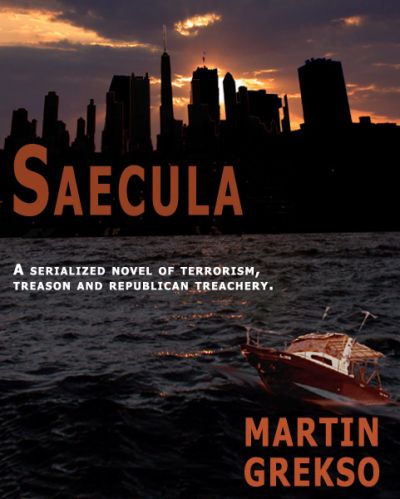
2007
Episode
6
The
Islamic war
Previously in "Saecula:” An elite Republican
cabal conspires to fix the
2008 presidential election, but its plans
to embezzle money from the RNC
are uncovered and lead to murder.
Democratic congressman Jack Stibik
and his mentor, Professor Gar Reynolds,
reunite. Martys, Jack's twin brother
and Delta Force eveteran, visits Annapolis.
Fifty-seven nations are considered primarily Muslim: from Mauritania and Morocco on the northwest coast of Africa to Somalia and Egypt on the Red Sea, up through Bosnia and Turkey in the belly of Europe, across the Middle East and the Arabian Peninsula, into the “Stans” and newly independent Chechnya in the southern Urals, and on to Malaysia and Indonesia in southeast Asia. One point one billion people, who after Christians, form the largest religious denomination in the world. Their soul was forged in the Tigress and Euphrates valleys, the cradle of western civilization, by Egyptians, Babylonians, Phoenicians, Persians. And, they were awakening to their collective culture, faith, pan-nationalism and, most troubling for America and the West, their economic and military power.
The war on state-sponsored terrorism and defense
of the homeland was declared by George W. Bush on September 12th, 2001.
The administration ensured that it had become inseparable in Americans’
minds from
its misdirected response to the 9/11 attacks in
what was essentially a unilateral invasion of Iraq to destroy Saddam’s
nonexistent weapons of mass destruction. Faced with unexpected and fierce
urban resistance and a mounting U.S. death toll, the administration compounded
its mistakes by relinquishing autonomy of Iraq prematurely in order to
claim progress by the 2006 congressional elections. Within months, the
newly elected Shiite government under Muslim cleric Muqtada al-Sadr nuzzled
up to the ayatollahs in neighboring Iran and flung open Iraq’s borders
to every conceivable Islamic nationalist organization in the world. This
included providing refuge for the Hamas leadership from Mossad retaliation
for killing former Israeli Prime Minister
Ariel Sharon, shortly after Sharon resigned under
a cloud of corruption. The U.S. saw no alternative but to reassert control,
essentially overthrowing the legitimately elected government and exacerbating
anti-American sentiments among Muslim nationalists around the world.
It sparked the cataclysmic Islamic War, the quintessential
quagmire that kept getting deeper by the day.
Islamic reaction to America’s blatant imperialism
cloaked as self defense and nation building, was to pressure
the United States’ Muslim allies to shed American
influence, or have their secular governments overthrown
by radical fundamentalists. When the House of
Saud was nearly toppled in a radical Shiite coup, it called for American
assistance to stabilize the situation. The U.S. and Great Britain sent
troops to reinforce the Royal
Saudi military and to protect the West’s oil lifeline,
the Rub al-Khali, or the Empty Quarter, in the country’s eastern province.
Then, at the very moment the Pentagon declared
the situation in Saudi Arabia stabilized, the newly constituted Republic
of Jordan’s army in coordination with longtime American foes, Syria and
Iran, invaded Iraq along its western and northeastern borders. It was the
Chinese crossing the Yalu River all over again, driving the unprepared
and undermanned American forces into the country’s southern provinces.
The overthrow of
Jordan’s King Abdullah, who had refused to “realign”
his kingdom, and the subsequent acquiescence by the military’s general
staff with the radical reformers, had taken the CIA by complete surprise.
One more black
mark was added to its predictions’ record, had
there been any room left on that particular page.
With Sadr reinstalled as president of Iraq, his
first act was to break with the Organization of Petroleum
Exporting Countries and flood China and other
third world economies with cheap oil while cutting off the U.S.
The policies of the Saudi dominated eleven-member
OPEC had evolved through decades of private deals
between the House of Saud and European and American
oil conglomerates -- all with government collusion,
of course -- to set world oil prices between $30
and $35 a barrel. This practice ensured a stable market,
allowing western economies to thrive, while still
providing income sufficient to keep the sheiks in their palaces. Already,
Sadr had recruited Algeria, Iran, Libya, Nigeria, Malaysia and several
smaller, emerging Central
African and South Asian producers to align themselves
with his new Alliance of Petroleum Exporting Nations.
Sadr intended to establish greater economic parity
between the exporting and importing countries and to
smash the dominance of the OPEC cartel in order
to grab America by its oil- dependent balls.
As for the rest of the Arabian Peninsula, the sheikdoms
of Bahrain and the United Arab Emirates declared neutrality rather than
suffer revolution. They expelled all American corporate contractors and
military
personnel and aligned themselves with the new
APEN. Of course, the ruling families excluded their personal
black market operations and continued to retain
profits from oil sales to the West. Only Qatar, with the headquarters of
the U.S. Central Command, the new home port of the 5th fleet and its 15,000-
foot runway, longest in the region, was left on the Persian Gulf between
American troops fighting in Kuwait and southern
Iraq and still friendly Oman on the Arabian Sea.
When Iraq and APEN turned off the spigot, the American
economy tanked.
With the price of gas nearing $8 a gallon, the
airline, trucking and tourist industries collapsed. Factories run
on petroleum-driven electricity laid off nearly
two million workers. The “upside” in Pentagonese was the “acceleration
of economy-driven recruitment” resulting in thousands of young men and
women, jobless as
a result of the war, now fighting in it. Five
hundred and fifty thousand American troops were now committed
in the Middle East and across South Asia.
Meanwhile, the numerous offshoots of al-Qaida that
had survived Osama bin Laden when he was killed in
the 2005 Pakistan earthquakes, increased their
missions against American embassies and global corporate facilities. Bechtel,
Halliburton, Exxon-Mobil, Hewlett-Packard, Cargill and other American multinational
corporations’ executives and their families living abroad had become standard
fare for kidnappings, home invasions, roadside ambushes and sniper shootings.
American troops, limited almost exclusively to urban
enclaves, were constant targets of snipers and
hit and run mortar and rocket barrages.
On the domestic front, no further attacks had succeeded
since 9/11, but two major threats had been thwarted. Cesium powder and
other components for a dirty bomb -- officially, a radiological dispersion
device -- were discovered in steamer trunks on a cruise ship docked in
the Port of New Orleans. Had it been activated,
it could have killed hundreds from the initial
blast and thousands more who ingested or inhaled the
contaminated residue. The Big Easy, still recovering
from Hurricane Katrina the previous year, would have become the Big Queasy,
uninhabitable for 20 years. Later the same month, an underground Islamic
cell
operating out of Dearborn, Michigan was rounded
up during a routine investigation. They were found to
be in possession of enough heavy weapons and explosives
to launch a minor insurrection.
The civilian neo-conservatives in the Pentagon
who had midwifed the original Iraqi War had long ago
forgotten about winning Arab hearts and minds
and democratizing Iraq. They were now desperately
trying to hang on to the last Middle Eastern oil
fields still in American hands -- in Saudi Arabia, Kuwait
and the recently-created Republic of Kurdistan,
formerly part of northern Iraq and eastern Turkey.
It had truly become the showdown between virtue
and evil that the President had proclaimed in 2002.
It just didn’t work out quite the way he called
it.
A SENATE HEARING ROOM
As ranking member of the Democratic minority on
the House International Relations Committee,
Jack Stibik was one of the four co-chairs of the
hearings. Joining him were Winnie Scott, ranking Democrat
on the Senate Foreign Relations Committee. Their
Republican counterparts were committee chairs Senator
Russ Hollingsworth and Representative Leon Franks.
As Congress’ primary watchdogs on foreign affairs,
the two committees were intimately engaged in
the administration’s conduct of the Islamic War, the subject
of the current proceedings.
Each of the four principals could call on one outside
expert of their choosing as closing witnesses. Jack was
relieved when he heard from Gar Reynolds, committing
to testify. He intended to call him during next week’s wrap-up session.
Jack had begun setting the stage by focusing his questions of current witnesses
on the
historical relations between the West and the
Middle East.
The hearings, now in their third week of public
testimony, had been forced on the administration by public sentiment. They
were the first comprehensive review of the Middle Eastern policy the President
and his congressional allies had permitted since the 9/11 investigation
in 2004. That report had exposed the administration, as well as the Clinton
administration before it, and the intelligence community for being
asleep at the switch prior to the attacks on New
York and Washington. Unfortunately, it failed to go further
to chastise the government for diverting resources
and attention from the pursuit of al-Qaida to invading
Iraq, which in turn precipitated the current crisis.
The hearings had attracted a huge television audience
right from the start. But, today marked the beginning
of testimony by the big hitters, and viewership
would be off the charts. Just as the 9/11 hearings took place
during an national election cycle, with a year
to go before the presidential elections, these hearings were also accompanied
by the same accusations of politics, partisanship and grandstanding. So
be it, thought Stibik.
We’ve been bullied, lied to and manipulated for
six years. If the only way to stop this fucking war is to
grandstand before 50 million viewers to expose
the administration’s deceit and stupidity, than that’s
just what he and Winnie intended to do.
Although the GOP had recaptured the White House
in the 2004 elections by a hair, and controlled Congress
by a small margin, it ran the chambers -- and
the country -- as if it had garnered huge mandates.
The President’s record of working with Democrats
in the Texas Legislature and his “compassionate
conservative” platform had fooled Jack along with
most other congressional Democrats after 2000.
Jack was just idealistic enough to believe, given
the President’s track record and the closeness of the election,
that he truly intended to govern in a genuine
spirit of cooperation for the benefit of the whole country.
It became apparent pretty quickly that neither
the Chief Executive nor his henchmen in Congress, such as
House majority leader Antonin DuPrey, were in
any mood to cooperate with the Democrats. They immediately began to govern
by fiat: providing enormous tax breaks to corporations and the wealthy,
consistently choosing corporate profits over environmental protection,
and opting out of numerous international agreements, from banning land
mines to addressing global warming. Within a year of their unilateral declaration
of war on Iraq,
they had lost most Democratic bipartisan support,
and, except for Britain, hardened the opposition of the country’s NATO
allies.
With American troops fully engaged abroad, and
the homeland under near constant alert, the public was tiring
of war and demanding politicians find a way to
end the growing conflict. Even diehard Republicans were
beginning to question administration policies.
Americans had finally begun to realize the reason that they
were the target of Islamic radicals was not, as
administration officials and right-wing commentators had been feeding them
since 9/11, because a small faction of radical Muslims hated them for their
affluence and
democracy. In reality, America was the new colonial
power imposing its culture, economy and politics
throughout the Middle East and Islamic world.
A minority of independent voters, large enough to be
dangerously effective in the upcoming presidential
campaign, had lately come to realize what liberals
had been harping on for years: that America had
become “Them.” The Redcoats of the 21st century.
Next in "Saecula:” Democratic Senator Winnie
Scott scuttle administration strategy
with a blockbuster disclosure.
by Martin
Gresko

Interested in publishing
this manuscript?
Or to make comments,
CONTACT Martin Gresko at VGABONSUN@hotmail.com
See his biweekly
political column http://www.StPetePost.com
